It has been an unforgiving year for bees. The relentless rain and cold weather, along with the ever present challenge of neonicotinoid insecticides have made life extremely difficult for them.
We watched sadly as our bees struggled to celebrate Spring, then hoped for new sources of nectar as the weeks went by but instead faced more rain and cold.
Their numbers dwindled and then one day there was no activity at all in any of the hives – and so it remained for weeks, with only a few curious insects of different species wandering into the hives.
It felt like a bereavement, because it was not always thus: they had become part of our lives over nearly 2 decades. Here is something I wrote more than a dozen years ago
2012
At first it was as terrifying as being inside a tornado. Yet seldom was there more than a breeze and almost always it would happen on a day which radiated humid warmth. All around was the raw energy of many thousand excited insects, each one of which had the wherewithal to deliver a painful sting - and enough stings could kill you.
Before I became the beekeeper’s assistant (to the head beekeeper - my wife), I knew little about bees apart from the pleasure of spooning honey onto warm toast.
One day a box had arrived. More accurately the box arrived in my car, and I was driving it. Throughout the journey it made a gentle hum, like the smooth sound of an expensive refrigerator singing to itself in an expensive kitchen (and not at all like our fridge that sounds like it is permanently gasping for breath).
The box had been strapped firmly shut but I was still relieved no longer to be sharing a confined space with it. It contained twenty thousand (give or take a few thousand) bees and one queen; even a few of them flying around in my car would have seen me abandoning it in the middle of the road and running across the fields.
You can buy bees as a colony. Because bees are as loyal subjects to their queen as we are to ours (this was written while Quuen Elizabeth was very much alive), they will stay with her and they are relatively easy to transfer to a hive.
The hive had been made ready for the first colony. It had all mod cons (which for bees meant sheets of wax held in place by wooden frames). The new bees were then encouraged into their new home, but not before they had been gently smoked.
No beekeeper can be without a smoker. This looks like a blow torch and is stuffed with hessian or leaves which are then lit to produce smoke, kept going by a small set of bellows attached. Apparently during forest fires, bees will gorge themselves on honey in case they have to vacate their colony and relocate. They then cannot sting so easily and become (relatively) calm.
So was started our apiary on a patch of lawn that was not too near the neighbours. Bees, I found, are generally harmless and much nicer than wasps which tend to sting just for the hell of it.
But their reputation is for fierce defence of their hives, and there are many Norfolk tales of money and valuables being placed in bee hives, in the certain knowledge that most burglars would prefer to break into houses than to be stung.
Note to prospective burglars: I am not going to tell you if the family silver is in our hives but I don’t recommend you try to find out.
Every now and then the bees seem collectively to have a bad day and gratuitously they will sting anyone who comes near them. This is particularly so if you are wearing dark clothes and have not washed recently; they think you might be a bear and up to no good. One unfortunate delivery driver received 2 stings for doing no more than ringing the door bell. We had to placate him with strong coffee, some ointment and several jars of honey.
Tip: if you do get stung, the bee that carried out the attack emits a pheromone which then encourages other bees to join in. You cannot outrun a bee but the best bet is to hide in some bushes or under a low tree. The bees will then think you have become a plant and stop bothering you.
Swarming is a natural process to enable colonies to reproduce. A huge cloud of bees leaves the hive with a deafening noise. Somewhere in the middle is the queen. A hatching queen is left behind in the hive with half the colony.
Eventually the swarm settles – usually on a branch, and generally high up. Bee keepers love swarms because they can gain a colony free of charge
Whenever our bees swarm there is a general alert. My legal cases come to a halt. The household chores stop in mid stroke and we all don our “space suits” - sealed overalls which go over normal clothes and make us look as though we have come to deal with a radio active spill.
If the bees are on a high branch our [late] Green Goddess fire engine (see my earlier posting: The Goddess is gone) is pressed into service as a high platform.
The queen and as many bees as possible are shaken into a cardboard box which is then upended onto a sheet near to an empty hive. If the queen is put into the hive, the worker bees obediently run over the sheet in a yellow/black wave into the hive.
On the basis that they are residences for the queen, each of our hives is named after a royal palace – Buckingham Palace, Kensington Palace, Balmoral and so on.
The object is to produce honey. This is a deliciously sticky experience. The frames, now with hexagonal cells built by the bees and brimming with honey are removed (usually along with a few bees) and brought inside, where the tops of the cells are sliced off prior to being loaded into an extractor. This is like a spin dryer – except it has to be turned by hand (an aching experience).
Slowly the honey oozes out of the frames and down into the extractor where the amber nectar (the real thing not that stuff that is imported from Australia) is poured into buckets prior to being filtered and put into jars.
It can then last for thousands of years without spoiling. Honey found in the tombs of the pharaohs was still edible, but the pharaohs did not have our family and friends to contend with. Our honey does not last nearly as long – it is too delicious to keep and is rapidly eaten, so the moral is to get in early when we are doing our extraction or the answer to the question in Rupert Brooke’s Old Vicarage, Granchester. (Is there honey still for tea?) will be a resounding “no”.
2024
Some years ago we stopped taking honey from the bees and left them to their own devices. Mostly they care for themselves better than we humans can. Every now and then we have changed their frames or propped up their hives if they are leaning at a jaunty angle. For one colony even that hands off approach was not enough and they decamped to a hole in a tree many metres in the air where they survived for many years.
And then came silence this year. No bees in the hives, none on the plants. One day I spotted this:
I hurried to one of the hives and found it had miraculously come back to life with the bees pouring in and out as though they had been doing it all year and were asking what the fuss was about.
The other hives remained silent and forlorn – until today. I was wading through stinging nettles in search of a gas bottle (you do this kind of thing when you reach my age) when I found even greater activity at the Balmoral hive. This one had been silent even longer, but I am sure that some of the younger bees thumbed their noses at me as I approached.
So what happened? We can only guess that the bees concluded that winter must have come early and they had decided “bugger this” and chose to have a second hibernation. Whatever the explanation, it is good to have them back. I may go and give a kick to the remaining hives in case they need waking up.
Bee facts
It takes about 41,000 bee miles to fill one jar with honey. In that time the bees will have visited about 1.5 million flowers.
Bees have air conditioning in their hives: workers fan the hive to keep it at a constant temperature
Bees communicate the location and distance of sources of nectar by performing a complex dance.
Bees will fly up 3 miles or more from their hive in search of nectar.
If you have a major event in your family (like a wedding or a funeral you are supposed to tell your bees). I wonder if they would have any good advice if we told them about the problems with our political leaders (US and UK)?.
And if you would like to find out more about the risks of neonicotinoids, take a look at this: https://xerces.org/sites/default/files/2018-05/16-022_01_XercesSoc_How-Neonicotinoids-Can-Kill-Bees_web.pdf (or message me and I will send you the pdf). It’s a mere 84 pages but it is important. Without bees there would be no us, so I am very glad our bees have risen again from the dead.



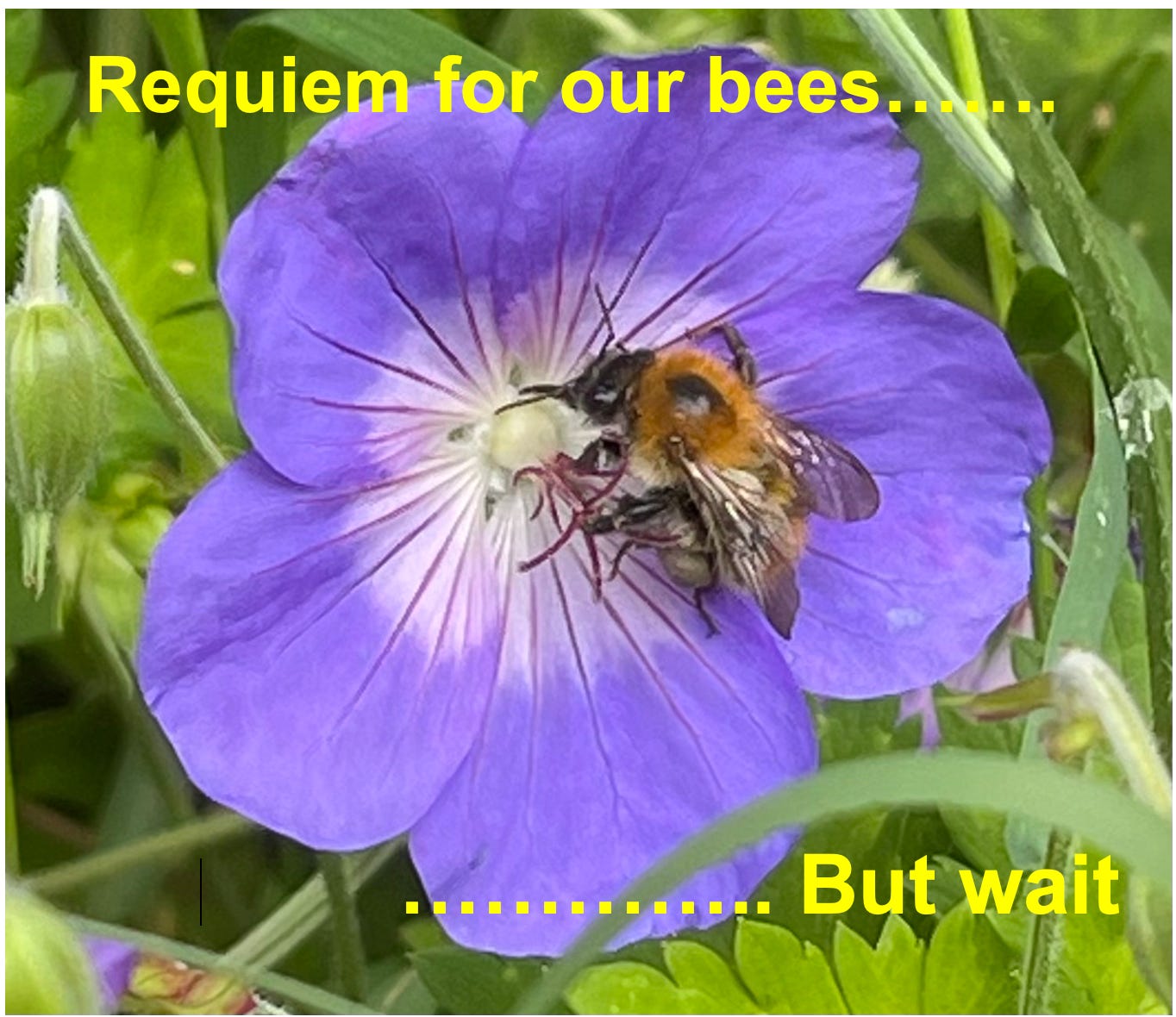
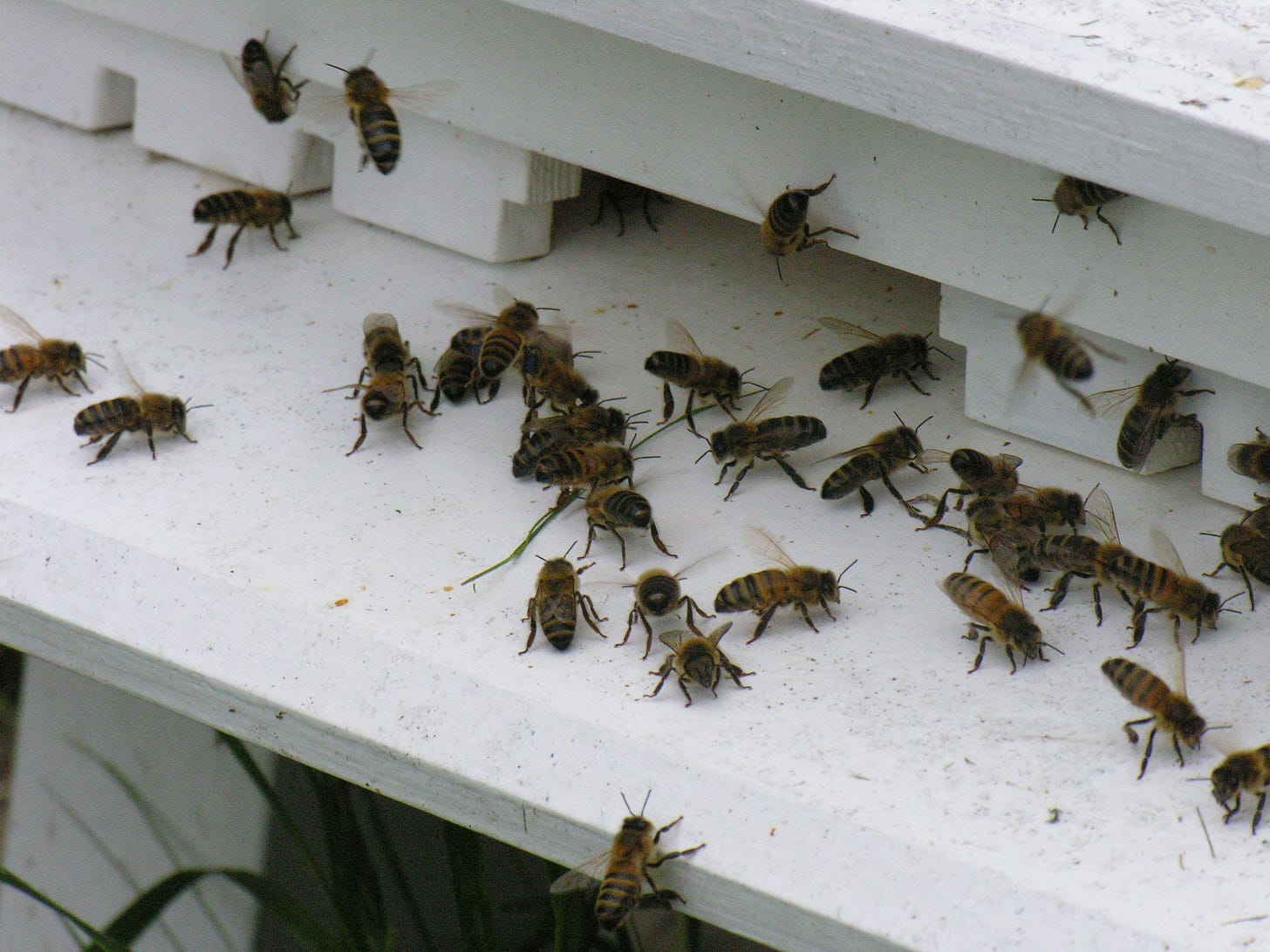
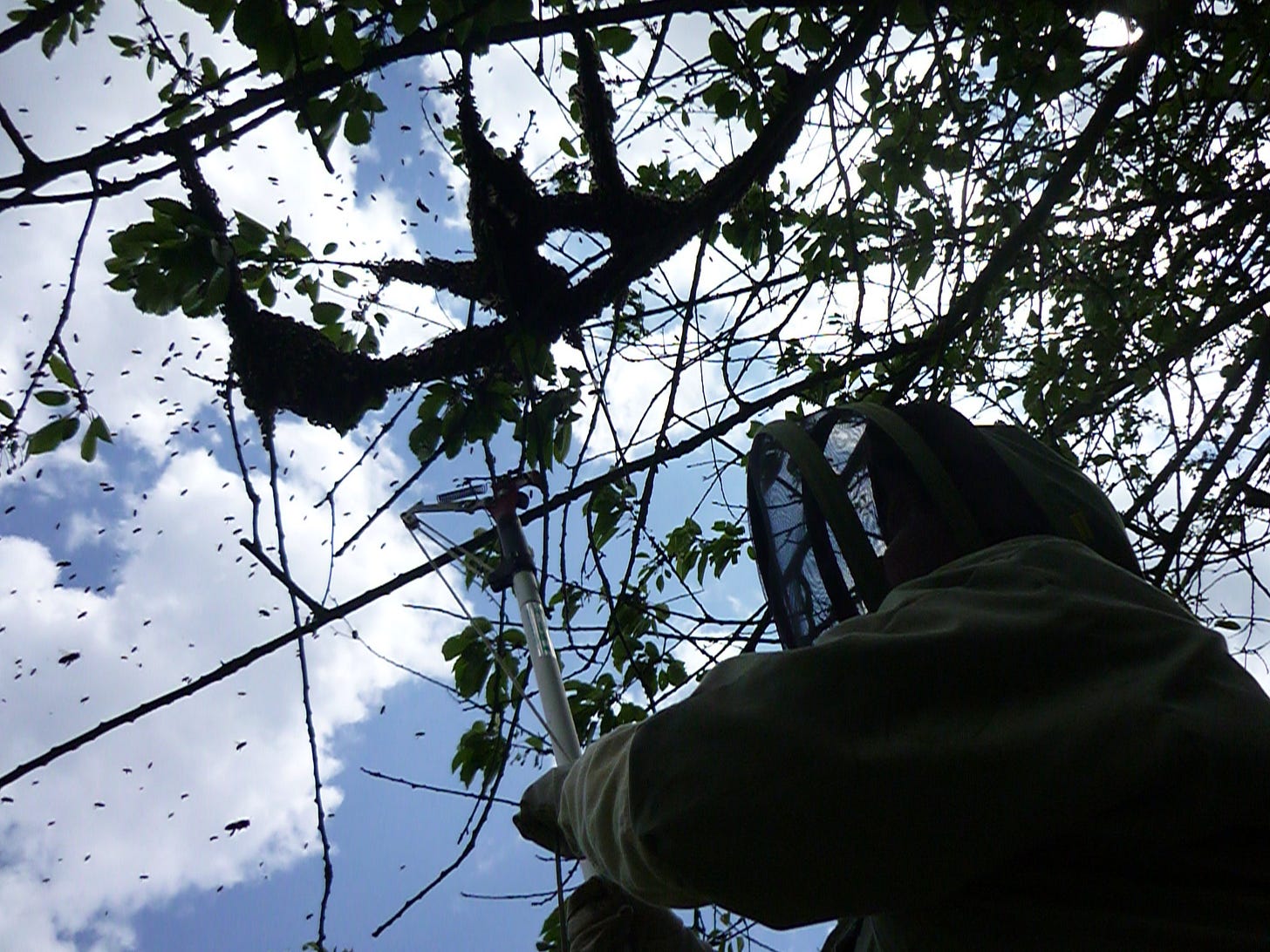
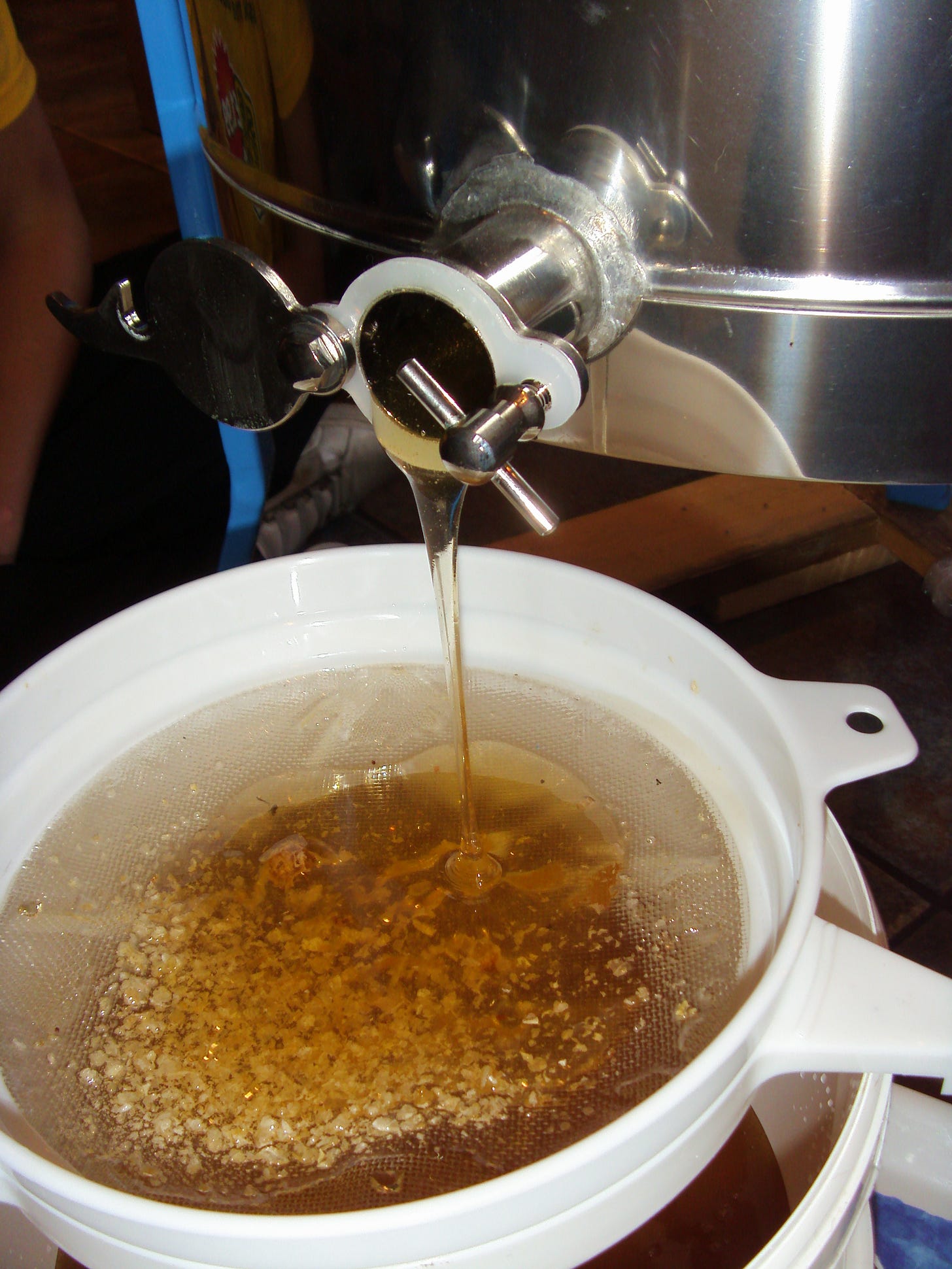
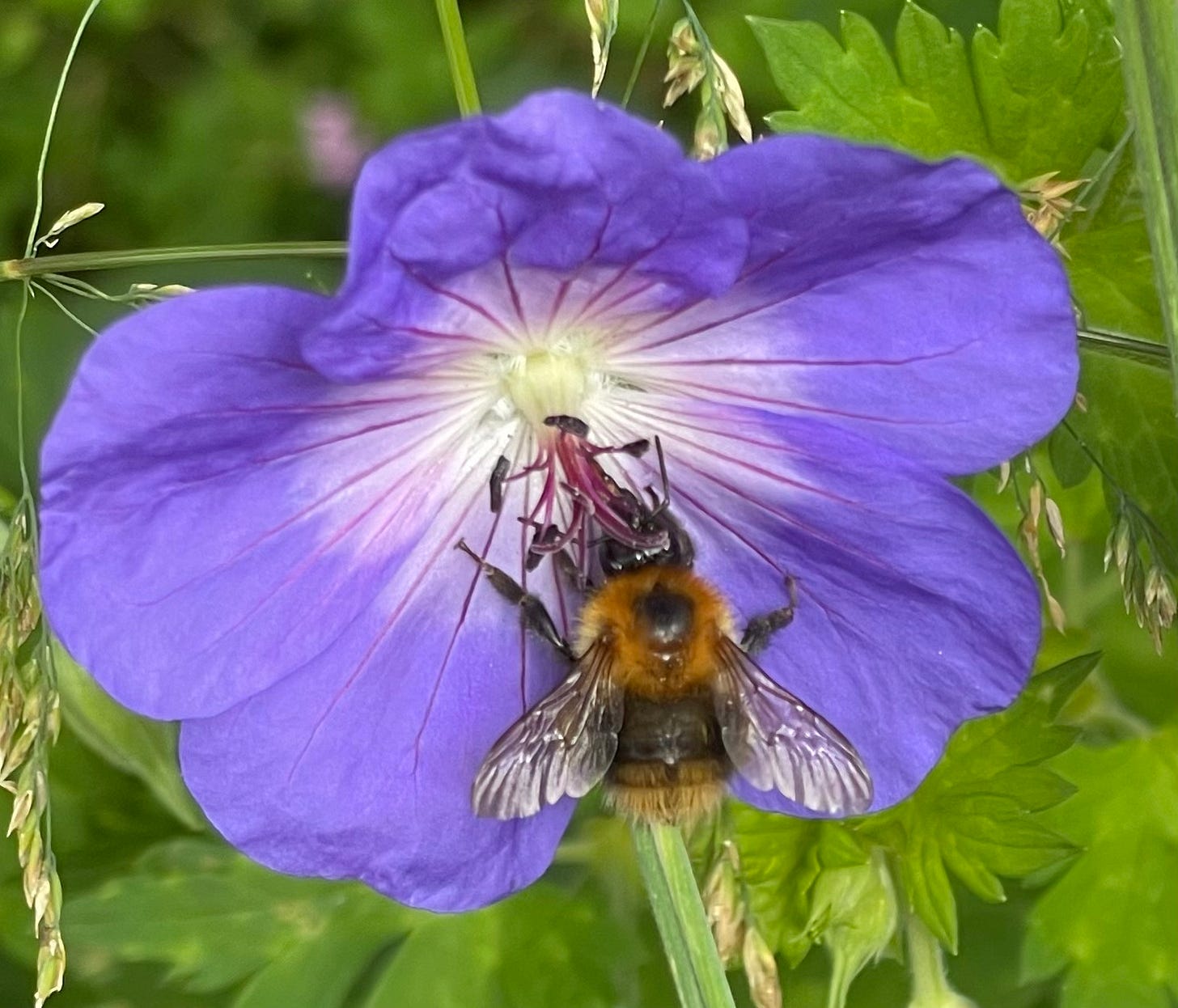
An amazing story.
Richard, As you now will know. President Biden is stepping aside. I was very much against this but no matter now, I will throw my support behind Kamala Harris and will worry a bit until I know who the VP pick will be. But reading this story calmed my mind & also made me laugh a bit, so thanks for that. Bees are important to our world. My name means Bee. So they have an even more special place in my heart. This story was a little adventure. I am amazing you drove home with bees in the car. I would have rented a little trailer & pulled them behind the car! 😄 Enjoy your honey & toast!